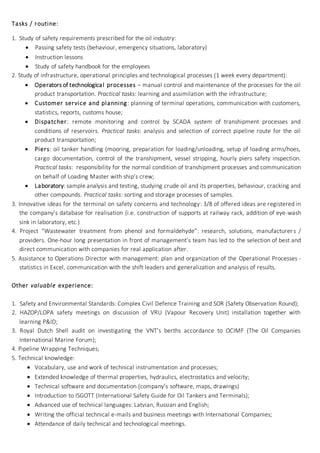
Review_Viktors
- 1. Tasks / routine: 1. Study of safety requirements prescribed for the oil industry: Passing safety tests (behaviour, emergency situations, laboratory) Instruction lessons Study of safety handbook for the employees 2. Study of infrastructure, operational principles and technological processes (1 week every department): Operators of technological processes – manual control and maintenance of the processes for the oil product transportation. Practical tasks: learning and assimilation with the infrastructure; Customer service and planning: planning of terminal operations, communication with customers, statistics, reports, customs house; Dispatcher: remote monitoring and control by SCADA system of transhipment processes and conditions of reservoirs. Practical tasks: analysis and selection of correct pipeline route for the oil product transportation; Piers: oil tanker handling (mooring, preparation for loading/unloading, setup of loading arms/hoes, cargo documentation, control of the transhipment, vessel stripping, hourly piers safety inspection. Practical tasks: responsibility for the normal condition of transhipment processes and communication on behalf of Loading Master with ship’s crew; Laboratory: sample analysis and testing, studying crude oil and its properties, behaviour, cracking and other compounds. Practical tasks: sorting and storage processes of samples. 3. Innovative ideas for the terminal on safety concerns and technology: 3/8 of offered ideas are registered in the company’s database for realisation (i.e. construction of supports at railway rack, addition of eye-wash sink in laboratory, etc.) 4. Project “Wastewater treatment from phenol and formaldehyde”: research, solutions, manufacturers / providers. One-hour long presentation in front of management’s team has led to the selection of best and direct communication with companies for real application after. 5. Assistance to Operations Director with management: plan and organization of the Operational Processes - statistics in Excel, communication with the shift leaders and generalization and analysis of results. Other valuable experience: 1. Safety and Environmental Standards: Complex Civil Defence Training and SOR (Safety Observation Round); 2. HAZOP/LOPA safety meetings on discussion of VRU (Vapour Recovery Unit) installation together with learning P&ID; 3. Royal Dutch Shell audit on investigating the VNT’s berths accordance to OCIMF (The Oil Companies International Marine Forum); 4. Pipeline Wrapping Techniques; 5. Technical knowledge: Vocabulary, use and work of technical instrumentation and processes; Extended knowledge of thermal properties, hydraulics, electrostatics and velocity; Technical software and documentation (company’s software, maps, drawings) Introduction to ISGOTT (International Safety Guide for Oil Tankers and Terminals); Advanced use of technical languages: Latvian, Russian and English; Writing the official technical e-mails and business meetings with International Companies; Attendance of daily technical and technological meetings.